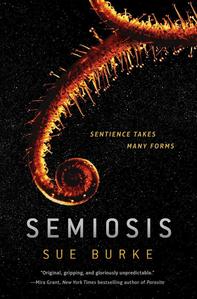 Sue Burke has been a literary translator as well as a journalist and editor for a variety of newspapers and magazines. She has also published several short stories. Burke lives in Chicago, and Semiosis (Tor Books)--a story about an alien world and sentient species--is her debut novel. Our review is below.
Sue Burke has been a literary translator as well as a journalist and editor for a variety of newspapers and magazines. She has also published several short stories. Burke lives in Chicago, and Semiosis (Tor Books)--a story about an alien world and sentient species--is her debut novel. Our review is below.
Sentient plants--what an astonishing idea for a story. Where did it come from?
It started with house plants. One of my plants killed another plant. It wrapped around the other plant and starved it. And then another plant tried to sink roots into a different plant. I stopped that in time, and thought it was suspicious--two attempted murders in my house. I started doing some research and found that plants are really terrible. They compete viciously with each other, they kill each other. For example, in the forest, hardwood trees grow slowly--it takes a lot of energy and nutrients. But the advantage is that most of the other trees are softwood. So as a hardwood grows, its branches rub against the softwood branches and saw them off. So they saw their way up to the top of the forest at the cost of other plants. That's just one example of a variety of things plants do to each other. There is a limited amount of water--they can't do much about that. But they need light, and fight to the death over that.
I did a lot of research into plants. They are not passive. They are resourceful. They also cooperate, when it's helpful to them. They are very active in this world and if they could think just a little bit (and it's not clear that they don't think), if they could plan ahead a lot more carefully than they do, then what would happen? That was the question that motivated Semiosis. Knowing that plants are active and kind of impatient, if they had a chance, what would their world be like?
Why did you tell the story over seven generations?
That was simply because plants are slow. I had to give Stevland (the bamboo) enough time to figure out there was a new animal around, and how he could deal with it. There had to be a long period of time between chapter one and two. Then time for the humans and Stevland to start to work together--that couldn't be fast, in part because they had so much to learn about each other.
I'm writing a piece about the Osage orange, whose fruit is designed for an animal that is now extinct. The orange hasn't figured out that the animal has been gone for 11,000 years. To them, it's been only a few generations and they haven't had much time to react. On Pax, the plants do react quicker, because intelligence gives them more options to think a problem through rather than living a problem through.
I wanted to make it as real as I could. Nothing happens on Pax, with plants and animals, that couldn't happen here if plants could think. Plants can make poisons, they can try to kill us, they can try to feed us, they can be trained to be cooperative. We know that even among species, trees will warn each other if a pest attacks them, so that the other trees can make pesticides. They can do that within a couple days. They are very good at making chemicals, but if they have to notice there is a change in the animal that distributes their seeds, that will take several generations. And then they have to figure out what to do about it.  Early on, Octavo, the botanist, realizes that the colony is in battle for dominance, exactly what they had left behind on Earth. Vera says they left behind the failed paradigms of war. But you seem to be saying that that's the dominant paradigm no matter the intentions of people. Or plants.
Early on, Octavo, the botanist, realizes that the colony is in battle for dominance, exactly what they had left behind on Earth. Vera says they left behind the failed paradigms of war. But you seem to be saying that that's the dominant paradigm no matter the intentions of people. Or plants.
Well, that is the premise of the book. I don't know if that's necessarily true. But there was a botanist who said, "All plants of a given place are in a state of war with respect to each other." So if that's the case with plants, then yes. I think that even among people it's going to be hard to eradicate war.
Sylvia and Julian discover the rainbow bamboo and eat its fruit--it's not forbidden fruit, but the bamboo uses the fruit to pacify the people? Keep them happy?
Or to keep them dependent, the way we're all dependent on a food source. And there's caffeine in it, so it's mildly addictive. Like, are we going to throw away all our coffee plants?
That would be the end of life!
Right. So the bamboo makes the fruit as attractive as it can be to make these particular animals loyal to him. Then it goes further, because he is so lonely. He's a bit neurotic and has abandonment issues. He's a social species. He is self-aware enough to know that he has to keep the humans with him because he needs company.
Octavo says that plants are not altruistic.
We are altruistic as a social species. We help each other out, but we don't necessarily help out things that are not in our society, whether it's narrowly defined as humans vs. humans, or humans vs. another species. We don't go out of our way to help certain wild animals, we don't think much about chopping down forests. Plants don't help us because it's a nice thing; they get an advantage out of it.
Your animals are fascinating, sometimes scary. The fippocats and fippolions are particularly endearing.
The fippocats were actually my sister-in-law's imaginary animals when she was six years old. She gave me permission to use them and she told me a little bit about them. They can hop, they can slide, they're furry and green. So I took that and ran with it. She likes what I did with her animals.
Will there be a sequel?
Yes, I've already written it, and am working on the third book in the series. It's set about 100 years after the end of Semiosis. A group of anthropologists from Earth come to Pax to see if the colony survived. And they don't get along, among themselves and elsewhere. --Marilyn Dahl

